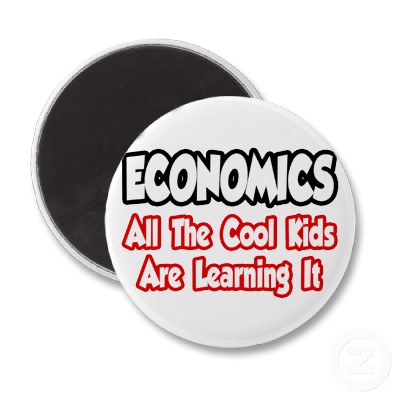 My daughter started studying economics this month in school. She’s eight. I was eighteen, in college, before I had my first taste. So can I just say? It’s about damn time.
My daughter started studying economics this month in school. She’s eight. I was eighteen, in college, before I had my first taste. So can I just say? It’s about damn time.
After all, economies and families are a lot alike: they both involve competition for scarce resources; family members, like consumers, often believe themselves to be behaving rationally when nothing could be further from the truth; and regardless of how many books are written on the subject, no one knows how to manage either efficiently.
The sooner my daughters acknowledge these glaring similarities, the sooner they can appreciate the following nuances of daily life in our household:
Supply and Demand: as my 3rd grader is no doubt learning, supply and demand share an inverse relationship—i.e., the lower the supply, the higher the price. So the next time she wants my attention the very same moment I’ve answered the telephone, or let’s face it, because I’ve answered the telephone, she’ll be asked to either pay $1 per interruption or wait until my attention is once again free of charge.
Point of Diminishing Returns: someday my girls will understand that at a certain point, adding more and more of one thing (time, glitter, hair accessories) yields a smaller per-unit return on the end product. Probably not until we run out of glitter, though.
Economies of Scale: why I buy my wine in a box; it’s cheaper.
Opportunity Cost: or as it’s more poetically known in my household: “there ain’t no such thing as a free lunch.” So when they ask why I didn’t buy them the whole back-half of the American Girl catalog, I like to remind them that I kind of like having a roof over my head.
Substitution Effect: a fickle bunch we are—consumers and family members alike. So when the price of one thing goes up, we find a cheaper alternative. Or in the case of my girls, they’ll wear shoes two sizes too small rather than go all the way upstairs to get the shoes they really want.
Return on Investment: Alas, not all is lost. There is a return on investment when we choose to dedicate our lives to the care and well-being of our children: we get their love back ten-fold. But usually not until they become full humans, which according to my mother-in-law is about twenty-six years of age.
Also? Economies are cyclical, which means that someday our children will have to endure the same irrational behavior of their own children.